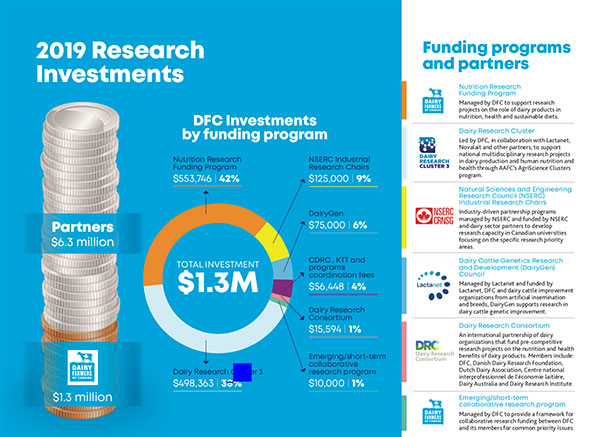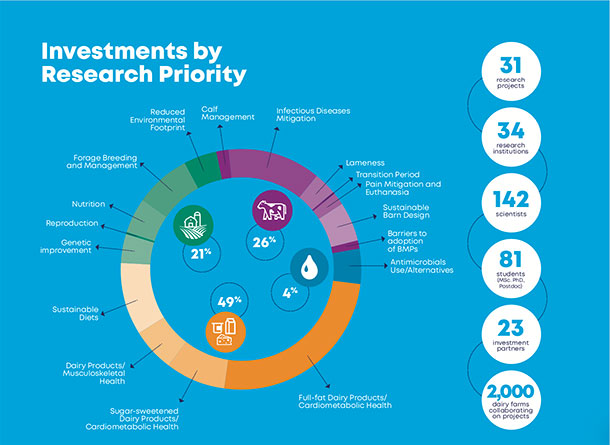It is an annual report on DFC’s investments in dairy production and human nutrition and health research and includes a list of all research projects in progress, as well as key results from completed and ongoing projects.
Key takeaways – DFC investments in research

- DFC invested $1.3 million in dairy production and human nutrition and health research. It leveraged this amount to add another $6.6 million in investments from multiple funding partners. Total investments in research in 2019 at the national level were $7.9 million.
- 31 research projects are underway in 34 institutions, including research centres and universities across Canada.
- About 2,000 dairy farmers from coast to coast are investing their time as part of several research projects to help drive innovation in the Canadian dairy sector.
- Close to half of research investments (49%) target priorities focused on the role of dairy products in human nutrition and health.
- Twenty-six percent of investments in research target priorities in animal health and welfare; 21% are directed to farm efficiency and sustainability solutions and another 4% on milk quality.
- More than 200 communications and knowledge translation and transfer products in both languages were developed and disseminated to targeted user audiences.
Tracking and reporting on research success

The report also features 11 success stories from a selection of research projects in dairy production and human nutrition and health. Listed below is a short summary of the stories you can access in the report online, by area of priority identified in the National Dairy Research Strategy. Find out how dairy research is advancing the Canadian dairy sector for the future.
Dairy farm efficiency and sustainability
- Genomics of feed efficiency: Genetically selecting cows for their feed efficiency and low methane emissions will soon be possible in Canada.
- New evidence – Cows in Canada emit less methane: Dairy cows in Canada emit less methane than previously reported in national and international greenhouse gas emissions (GHGs) reports.
- New genetic and management tools improve hoof health: A Dairy Research Cluster 2 research project on improving hoof health in Canadian dairy herds resulted in the development of two new tools for farmers to improve their cows’ hoof health.
Animal health and welfare
- Bedding and stall changes can have a big impact on cow comfort and farm performance: Farmers demonstrate how they modified their tiestall systems for better performance.
Milk composition, quality and safety
- Reducing antibiotic use – National surveillance system for antimicrobial stewardship and resistance: Researchers developed a surveillance program and research platform called the Canadian Dairy Network of Antimicrobial Stewardship and Resistance (CaDNetASR) that allows for the collection of data and measures antimicrobial use (AMU) and its relation to animal health and antimicrobial resistance (AMR).
- Selective dry cow therapy – A strategy for udder health and milk quality: Researchers from the Mastitis Network found that quarter-based selective dry cow therapy is a farm management strategy with the potential to reduce antibiotic use at dry-off by an average of 60%.
Milk products and their components in human nutrition and health
- New knowledge with Canadian data reported that diets containing dairy products can reduce the risk of metabolic syndrome, cardiovascular disease and type 2 diabetes.
- Vitamin B12 is better absorbed from milk and dairy products: Researchers found that vitamin B12 is much better absorbed when consumed in cow’s milk than when taken in vitamin supplements and that cheddar cheese is one of the best natural sources of vitamin B12, after cow’s milk.
- Dairy product consumption is associated with lower risk of mortality, cardiovascular events and type 2 diabetes: A team of researchers found that dairy consumption, especially of whole-fat dairy, was associated with a lower risk of mortality and major cardiovascular disease (CVD) events in a diverse multinational population.
- New evidence – Dairy products are an important part of adolescent girls’ diet for bone health: Research found three to four servings of dairy products per day improved bone health in overweight and obese adolescent girls.
Visit Dairy research to download a copy of the 2019 Dairy Research Highlights.
Canadian Dairy Research: For a profitable, innovative and sustainable sector
Dairy Farmers of Canada (DFC) invests in research to stimulate productivity, sustainability and profitability on farms and to improve knowledge on milk and dairy products’ health benefits. DFC finances research initiatives that benefit all dairy farmers across Canada and works in collaboration with its members and other sectorial partners to address farmers’ priorities set in the dairy research and knowledge translation, and transfer national strategies. Visit Dairy research for more information.







